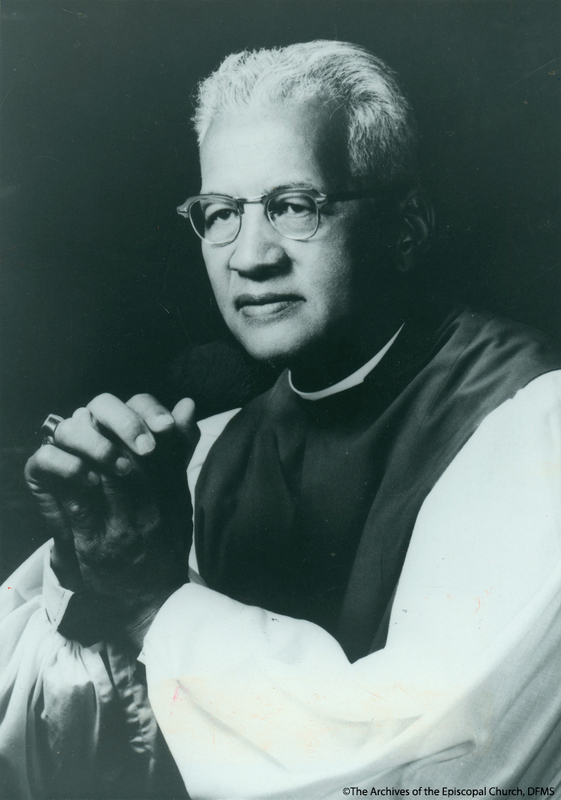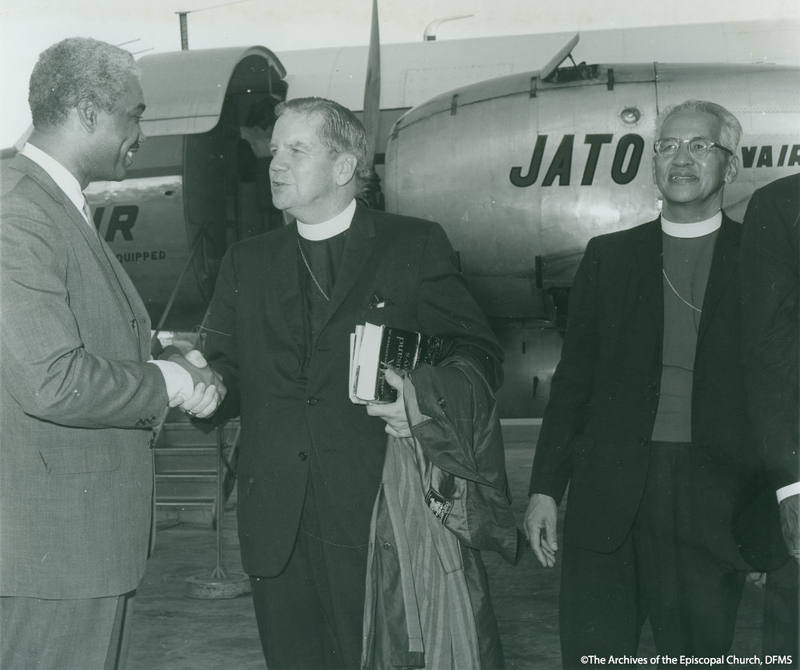Leadership Gallery
The Right Reverend Cedric Earl Mills, 1903-1992
There is no time in God's plan for a black heaven and a white heaven. There is no time for a white church and a black church. This is the church of God. This God has never been known to be any color.
- Cedric Earl Mills
Cedric Earl Mills, the first Bishop of the Virgin Islands, was born December 17, 1903 in Hartford, Connecticut. Committed to civil rights and a leader in both diocesan and community affairs, Mills was instrumental in the establishment and construction of several missions, churches and schools during his lifetime.
Mills attended Lincoln University in Pennsylvania where he earned his Bachelor of Arts degree in 1926 and married Rebecca Esther Taylor in June of the same year. The couple had one child. Mills received his Master's degree from the University of Pennsylvania in 1929 and completed his theological training at Philadelphia Divinity School. He was ordained to the diaconate in October 1929 and to the priesthood two months later. From 1929 to 1937 he was Priest-in-charge of Ascension Chapel in West Chester, Pennsylvania. While in West Chester, he served at St. Cyril's Mission in Coatsville, Pennsylvania and St. Mary's Church in Chester, Pennsylvania. Reflecting his commitment to education, Mills was appointed by the Bishop of Pennsylvania to act as Chaplain for the Episcopal students at Lincoln University, Cheyney State Teachers' College and Dovington Industrial School. In addition to serving as Chaplain, Mills was also the commandant of boys and taught science and mathematics at Dovington from 1935 to 1937. From 1937 to 1940 he was Priest-in-charge of St. Mark's Church in Plainfield, New Jersey. During his short tenure there, Mills eliminated the mission's indebtedness and began to develop the mission into a parish.
In 1940 Mills became Rector of St. James' Church in Baltimore, Maryland where he would serve the church and community for twenty-two years. During World War II, he served as Secretary to the Army and Navy Commission of the Diocese of Maryland. He was President of the Maryland Clericus in 1950 and served as a member of the Diocese of Maryland’s Executive Council from 1944 to 1950 and 1954 to 1957. He was a member of the Executive Council of The Episcopal Church from 1952 to 1954, a member of the Standing Committee of the Diocese of Maryland from 1958 to 1960, and a chairman of the Associate Study Commission of Maryland from 1958 to 1960, which proposed the first reorganization of the diocese. In 1961 he served as a deputy to General Convention.
Recognizing the interdependence between the church and politics, Mills utilized resources inside and out of the church to effect social change. During World War II, he led protests against segregation in schools. He also worked for racial equality as a member of the Government Commission on Problems Affecting the Negro Population and as a member of the Board of Directors of the NAACP.
Locally, Mills’ commitment to the Baltimore community included his work as a charter member of the Baltimore Chapter of the Frontiers of America, Inc.; a member of the Board of Directors of the Baltimore Council of Social Agencies; a member of the Board of Directors of the Baltimore County Social Agencies; a member of the Board of Directors of the Mental Hygiene Society of Greater Baltimore; Vice-President of the Board of Directors of the Citizens Planning and Housing Association; Vice-President of the Board of Directors of the Baltimore Urban League; Trustee of Provident Hospital; member of the Harlem Park Neighborhood Council; and chairman of the Board of Directors of the Lafayette Square Community Center.
Virgin Islands Government Secretary, Cyril E. King, left and Rt. Rev. Cedric Earl Mills, right, welcome the Presiding Bishop, Most Rev. John E. Hines, center, to St. Thomas, Virgin Islands, c. 1970.
A believer in the importance of education, Mills worked with many organizations in Baltimore. He was chairman of the Parent-Citizens Committee on Education; a member of the Advisory Committee of the Henryton School of Practical Nursing; chairman of the Survey Committee on Education; member of the Board of Managers of the George P. Bragg Fund; and counselor to the student nurses at Provident Hospital.
In recognition of his accomplishments in the Church and in Baltimore, Mills was elected as the first Bishop of the Virgin Islands at a meeting of the House of Bishops in Columbia, South Carolina in 1962. He was consecrated April 9, 1963 by Bishop Noble C. Powell of Maryland. Bishop A. Ervine Swift of Puerto Rico and Bishop John B. Bentley, the Vice President of the Executive Council, were co-consecrators. Previously the Church of England and the Episcopal Church divided jurisdiction over the parishes located in the British and U.S. Virgin Islands. Bishop Mills was the first leader of both national groups after ecclesiastical authority in the British Virgin Islands was transferred to the Episcopal Church in 1963. When Mills arrived in Charlotte Amalie, there were 5 Episcopal parishes and 3 Anglican parishes, with a total of 10,456 baptized members, but there was not yet an Episcopal residence. Immediately upon his arrival, Mills encouraged the diocese to share in the building of a residence on the islands, in an effort to show that the relationship between the larger Church and the missionary dioceses was one of mutuality, rather than dependence. By contributing to the residence, Bishop Mills felt his parishioners could prove that a missionary diocese could give as well as receive and that their contributions would strengthen their connection to the Church.
While in the Virgin Islands, Mills was appointed to the Joint Commission on Ecumenical Relations of the General Convention in 1964. He was also a member of the Bishops' Committee on Pastoral counseling and a member of the House of Bishops Overseas Committee. From 1963 to 1970, Mills called upon the Mutual Responsibility and Interdependence in the Body of Christ relationship with the companion Diocese of Maryland to assist with funding schools in the Virgin Islands and to develop a scholarship program. He also worked to expand the presence of the Church among the people of the Islands, challenging the laity to serve their community as Christians and calling for the construction of local parish churches across the Islands instead of devoting all of the diocese’s financial resources to a single cathedral. Committed to using the resources of the Church for the benefit of the entire community, Mills fought to ensure that the children of the Islands' primary workforce, non-resident aliens, had access to public education. Mills served as member of the Implementation Committee for the Alien Worker and His Family in 1967, and in 1969 he was appointed by the Governor as a member, later becoming Vice Chairman of the Special Commission to Study and Make Recommendations on the Status and Problems of Non-Citizens in the Virgin Islands.
In recognition of his commitment to education, Mills was the recipient of multiple honorary degrees. These include Doctor of Divinity degrees from Lincoln University in 1946, from the Philadelphia Divinity School in 1960, and from Trinity College in Hartford, Connecticut in 1970. Also awarded to Mills were a Doctor of Laws degree from St. Augustine's College in 1963 and a Doctor of Sacred Theology degree from Morgan State University in 1965.
In 1972, at the age of 69, Bishop Mills retired from the Virgin Islands. For the next twelve years, he assisted Bishop Robert C. Rusack in the Diocese of Los Angeles. Bishop Mills passed away on July 3, 1992 at the age of 89. [Sources]



